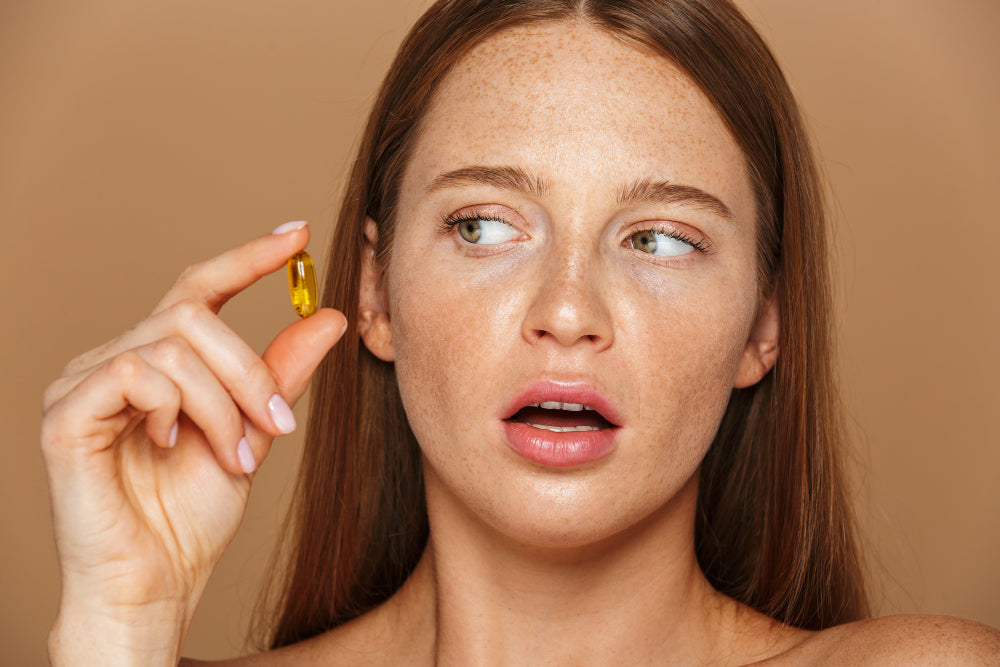Vitamin C, a radiant superhero in the skincare world, boasts anti-aging benefits and a glowing reputation. But for acne-prone individuals, the question arises: Can vitamin C cause acne?
While unlikely, vitamin C itself rarely causes acne. However, specific formulations or personal sensitivities in vitamin C or C serum can irritate the skin and trigger breakouts. Consult a dermatologist for personalized guidance.
This complete guide dives deep into the complex relationship between vitamin C and acne, exploring the potential benefits, hidden drawbacks, and critical factors before incorporating it into your routine.
Prepare to separate fact from fiction and discover if vitamin C can be your ally or nemesis in the fight for clear skin.
Can Vitamin C Make You Break Out?

Now, can this citrus champion trigger breakouts? Busting the myths and maximizing benefits here under:
Busting the Myth
First things first, let's address the myth. In its purest form, Vitamin C isn't likely to clog pores or directly cause acne. Its anti-inflammatory properties can even help calm down angry breakouts. So, breathe a sigh of relief; this antioxidant powerhouse isn't inherently your enemy.
Can Vitamin C Serum Cause Acne?
Vitamin C serum typically does not cause acne. It is often used to treat acne and scars due to its antioxidant and anti-inflammatory qualities.
However, if the serum contains comedogenic ingredients or is unsuitable for your skin type, it could trigger acne in some individuals. Choosing a non-comedogenic formula and patch-testing any new skincare product is essential to ensure it doesn't exacerbate acne or other skin issues.
But hold on, before you slather on that vitamin C serum like there's no tomorrow, there are some key factors to consider:
Formulation Matters
L-ascorbic acid, vitamin C's most common form in skincare, can be potent. It might cause irritation and redness for sensitive skin, which can mimic breakouts. Consider gentler derivatives like sodium ascorbyl phosphate, or look for buffered formulas.
Patch Testing is Your BFF
Before using any new product, you should do a patch test on your inner arm. It helps identify any possible allergies or sensitivities that could lead to breakouts.
Don't Forget the Rest
Remember, your skincare routine is an ecosystem. Harsh cleansers, heavy moisturizers, or other active ingredients like retinoids can interact with vitamin C and trigger irritation. Use high-quality skincare products to follow a personalized routine that considers your unique skin concerns.
Purging vs. Breaking Out
Introducing new activities like vitamin C can sometimes lead to an initial "purge," where existing blemishes surface before things clear up. Make sure to distinguish this from a confirmed breakout! Give your skin time to adjust (around 4-6 weeks) before throwing in the towel.
Bonus Tip: Look for oil-free formulas if you're acne-prone, as oil-based products can clog pores and contribute to breakouts.
So, should you ditch vitamin C altogether? Not! With the right approach and product selection, it will be a valuable addition to your acne-fighting arsenal.
Does Vitamin C Help Acne?
Yes, vitamin C can help with acne. It possesses unique antioxidant and anti-inflammatory properties that will help reduce redness and inflammation associated with acne.
Additionally, vitamin C promotes collagen production, which can help improve overall skin health and may assist in reducing the appearance of acne scars.
Vitamin C helps acne in several ways:
Anti-inflammatory Properties
Vitamin C can reduce inflammation and redness associated with acne lesions, helping to calm the skin and minimize discomfort.
Antioxidant Effects
It scavenges free radicals, contributing to skin damage and inflammation, thereby supporting overall skin health and potentially reducing the severity of acne.
Promotion of Collagen Production
Vitamin C stimulates collagen synthesis, which aids in wound healing and can help improve the appearance of acne scars over time.
Regulation of Sebum Production
Some research suggests that vitamin C may help regulate sebum production, which is beneficial in managing acne-prone skin by preventing excessive oiliness.
Protection Against UV Damage
Vitamin C protects against UV-induced damage, exacerbating acne and worsening inflammation. Incorporating vitamin C into your routine will be beneficial for managing acne and promoting healthier skin overall.
Does Vitamin C Help with Blackheads?
Yes, Vitamin C can help with blackheads by promoting exfoliation, reducing inflammation, and preventing the oxidation of sebum, which contributes to the formation of blackheads.
Conclusion
Vitamin C, often celebrated for its brightening and anti-aging effects, remains a skincare staple for many. However, concerns about whether vitamin C serum can exacerbate the condition may arise for individuals with acne.
While vitamin C is generally beneficial for acne-prone skin due to its remarkable anti-inflammatory and antioxidant properties, selecting a suitable formulation is essential.
Opting for non-comedogenic vitamin C serums and patch-testing new products can help mitigate any potential adverse reactions, ensuring that vitamin C continues to be a valuable addition to skincare routines for individuals with acne.
Remember, consistency and personalization are key. Now, conquer your skincare goals, armed with newfound knowledge!

